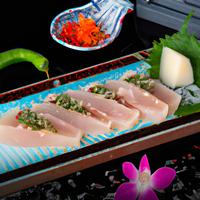
1 serving (100 grams) contains 146 calories, 23.0 grams of protein, 5.0 grams of fat, and 1.0 grams of carbohydrates.

Log this food in SnapCalorie

Nutrition Information
Calories |
347.6 | ||
|---|---|---|---|
% Daily Value* |
|||
| Total Fat | 11.9 g | 15% | |
| Saturated Fat | 3.6 g | 18% | |
| Polyunsaturated Fat | 0 g | ||
| Cholesterol | 95.2 mg | 31% | |
| Sodium | 1190.5 mg | 51% | |
| Total Carbohydrates | 2.4 g | 0% | |
| Dietary Fiber | 0 g | 0% | |
| Sugars | 0 g | ||
| protein | 54.8 g | 109% | |
| Vitamin D | 476.2 mcg | 2381% | |
| Calcium | 23.8 mg | 1% | |
| Iron | 1.2 mg | 6% | |
| Potassium | 714.3 mg | 15% | |
* Percent Daily Values are based on a 2,000 calorie diet. Your daily values may be higher or lower depending on your calorie needs.
Food Attributes
Source of Calories
About Marinated hamachi
Marinated Hamachi, also known as yellowtail, is a popular dish in Japanese cuisine celebrated for its delicate texture and rich flavor. Typically, the fish is thinly sliced and marinated in a blend of soy sauce, citrus juice (like yuzu or lemon), and occasionally sesame oil or mirin. This preparation enhances its natural sweetness while adding a tangy umami profile. Hamachi is a lean source of protein, rich in omega-3 fatty acids that support heart and brain health. It also provides essential nutrients such as vitamin D and selenium. However, due to its moderate mercury content, it’s advisable to consume in moderation, particularly for sensitive groups like pregnant women. Served alongside garnishes like radish, scallions, or microgreens, Marinated Hamachi is a flavorful and visually appealing dish ideal for light, nutrient-dense dining.



